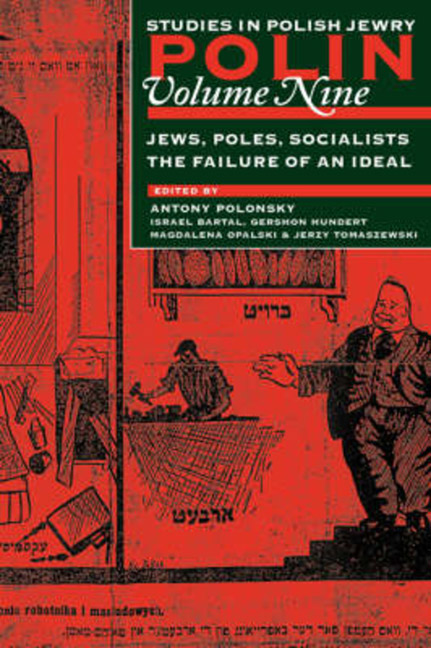Book contents
- Frontmatter
- Dedication
- Editors and Advisers
- Preface
- Acknowledgement
- Polin
- Polin: Studies in Polish Jewry
- Contents
- Note on Transliteration, Names, and Place Names
- Abbreviations
- Introduction
- PART I POLES, JEWS, SOCIALISTS: THE FAILURE OF AN IDEAL
- PART II NEW VIEWS
- PART III REVIEWS
- REVIEW ESSAYS
- BOOK REVIEWS
- Alfred Ebenbauer and Klaus Zatloukal (eds.), Die Juden in ihrer mittelalterlichen Umwelt
- Rivka Schatz-Uffenheimer, Hasidism as Mysticism
- Jadwiga Maurer, ‘Z matki obcej … ’
- Władyslaw T. Bartoszewski and Antony Polonsky (eds.), The Jews in Warsaw
- Maria Klańska, Problemfeld Galizien in deutschsprachiger Prosa 1846-191
- Israel Oppenheim, Tenuat Heḥaluts bePolin, 1929-1939
- The Letters of Martin Duber, ed. Nahum N. Glatzer and Paul Mendes-Flohr
- Alexander Heider, A Dictionary of Jewish Surnames from the Russian Empire
- Alice L. Eckardt (ed.), Burning Memory
- Ruta Sakowska, Ludzie z dzielnicy zamkniętej
- lwona Irwin-Zarecka, Neutralizing Memory
- Stanislaw Meducki and Zenon Wrona (eds.), Antyzydowskie wydarzenia kieleckie, 4 lipca 1946
- Bibliography Of Polish-Jewish Studies, 1993
- Notes on Contributors
- Notes on Translators
- Glossary
- Index
Maria Klańska, Problemfeld Galizien in deutschsprachiger Prosa 1846-191
from BOOK REVIEWS
- Frontmatter
- Dedication
- Editors and Advisers
- Preface
- Acknowledgement
- Polin
- Polin: Studies in Polish Jewry
- Contents
- Note on Transliteration, Names, and Place Names
- Abbreviations
- Introduction
- PART I POLES, JEWS, SOCIALISTS: THE FAILURE OF AN IDEAL
- PART II NEW VIEWS
- PART III REVIEWS
- REVIEW ESSAYS
- BOOK REVIEWS
- Alfred Ebenbauer and Klaus Zatloukal (eds.), Die Juden in ihrer mittelalterlichen Umwelt
- Rivka Schatz-Uffenheimer, Hasidism as Mysticism
- Jadwiga Maurer, ‘Z matki obcej … ’
- Władyslaw T. Bartoszewski and Antony Polonsky (eds.), The Jews in Warsaw
- Maria Klańska, Problemfeld Galizien in deutschsprachiger Prosa 1846-191
- Israel Oppenheim, Tenuat Heḥaluts bePolin, 1929-1939
- The Letters of Martin Duber, ed. Nahum N. Glatzer and Paul Mendes-Flohr
- Alexander Heider, A Dictionary of Jewish Surnames from the Russian Empire
- Alice L. Eckardt (ed.), Burning Memory
- Ruta Sakowska, Ludzie z dzielnicy zamkniętej
- lwona Irwin-Zarecka, Neutralizing Memory
- Stanislaw Meducki and Zenon Wrona (eds.), Antyzydowskie wydarzenia kieleckie, 4 lipca 1946
- Bibliography Of Polish-Jewish Studies, 1993
- Notes on Contributors
- Notes on Translators
- Glossary
- Index
Summary
This German version/second edition of a 1985 ‘Habilitationsschrift’ at the University of Kraków (published originally in an edition of only 150 copies) is undoubtedly a valuable contribution in that it demarginalizes a narrative world that appeared to be irretrievably lost to the canon of ‘German’ literature of that period. The author presents a representative triad of authors. There is Karl Emil Franzos, whose village stories were immensely popular during this period, like those of his counterpart in mainstream German literature, Berthold Auerbach. A second writer is Leopold von Sacher-Masoch of Freudian and Deleuzian fame (Sacher-Masoch: An Interpretation together with the Entire Text of Venus in Furs, 1967; English edn. 1971). Hans Weber-Lutkow (Hans Pokorny), a third author, is today largely forgotten. Many lesser authors are also introduced.
The book is clearly structured and composed. Since large parts of it are conventional history of literature, this facilitates back-checking when reading through new territory. After an introduction listing major methodological considerations, the first main chapter discusses the national-political dynamics leading to literary reflections in the works of Sacher-Masoch and Franzos. A second chapter addresses the issue of how the three above-mentioned authors viewed the social conflicts emerging from a number of changes and significant historical episodes (e.g. the gradual granting to Jews of equal civil rights under the Habsburg monarchy). The third chapter is basically a survey of literature that deals with assimilation and non-assimilation within the period mentioned in the title. In this reviewer's opinion, the principal merit of the study lies in its descriptive width and its embedding of this feature within historical-factual parameters. There are, however, also limitations when one looks for more profound insights along the lines of the history of mentalities; and there are shortcomings when it comes to literary analysis. Thus, for example, when the author surveys recent research on Heimatliteratur, or regional literature, in the introduction, Norbert Mecklenburg's seminal study of 1982 is briefly discussed (pp. 19 ff., although not mentioned in the register of names at the end of the book), but the rest of the monograph bears practically no evidence of his important and valuable set of criteria for the genre.
- Type
- Chapter
- Information
- Jews, Poles, Socialists: The Failure of an Ideal , pp. 282 - 284Publisher: Liverpool University PressPrint publication year: 2008



